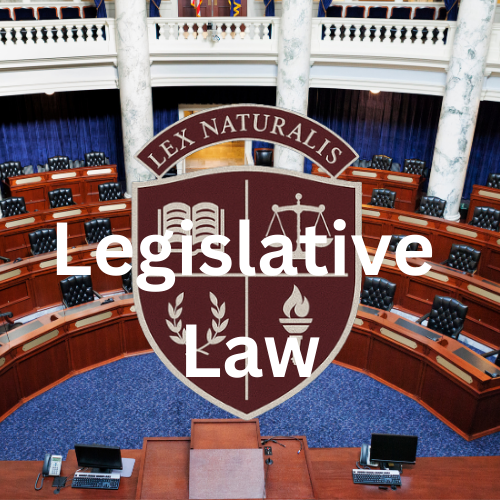Law vs. Statute: Recovering the Distinction Blackstone Never Lost
- Dr. Byron Gillory
- Sep 5
- 4 min read

I. The Forgotten Distinction
It hath become the habit of our age to confound things that are in their nature diverse. The words law and statute are now used as though they were interchangeable, and the confusion hath yielded no little mischief. For though every statute be law in the sense of civil command, not every law be statute; and the essence of law itself cannot be comprehended by statute alone.
Sir William Blackstone, in his celebrated Commentaries, did not err in this matter. He maintained ever the great distinction: that law in its most proper signification is “a rule of action, prescribed by the supreme power in a state, commanding what is right and prohibiting what is wrong.” Yet statute, though solemn and enrolled, is but one species of law—a particular manifestation of a more universal principle.
Modern jurisprudence hath too often lost sight of this, treating statutes as though they exhaust the meaning of law, and forgetting that the very craft of lawmaking must be guided by principles antecedent to the statute-book.
II. Statutory Law: The Product of Enactment
What, then, is statutory law? It is the written ordinance, passed by the legislative body, signed into effect, codified into titles and sections. It is the product of process: committee hearings, debates, votes, presentments. It speaks in the tongue of enactment: “Be it enacted by the Senate and House of Representatives…”
Statutory law hath the force of command, yet its quality is contingent. For statutes may be drafted with haste or care, with foresight or blindness. They may embody justice or injustice, order or disorder. Their authority is civil, yet their wisdom dependeth upon their craft.
Thus, statutory law is the edifice, binding yet fragile, a monument raised upon the foundations of prior reasoning. If the architect be careless, the edifice may yet stand—but it will lean, crack, and invite collapse.
III. Legislative Law: The Craft Behind the Statute
By contrast, Legislative Law is the science and art whereby statutes are conceived, designed, and ordered. It precedeth the statute and abideth within it. It is not the product but the craft, not the codex but the calculus by which statutes are wrought in harmony with justice and the constitution.
Here the jurist is no mere scribe. He is an architect of legal order, a steward of constitutional fidelity, a counselor in the service of clarity and durability. Legislative Law asketh such questions as these:
Doth this statute comport with natural right and constitutional limit?
Is its language precise, unambiguous, and durable across generations?
Are its provisions consonant with the larger body of enacted law?
Will it preserve liberty, order, and prosperity rather than breed confusion and litigation?
Thus Legislative Law is not identical with statutory law; it is the discipline whereby statutory law is perfected.
IV. The Mischief of Confusion
To neglect this distinction is to suffer grave harm. When statutes are treated as law itself, legislators grow careless, thinking their mere vote sufficient to render justice. Courts, too, may exalt the statute above principle, construing words without regard to their coherence with reason and constitutional order.
The consequence is before our eyes: volumes of statutes so swollen and contradictory that neither citizen nor magistrate can fully discern them; litigation multiplied; administrative agencies seizing upon vague clauses to extend their dominion. In such a climate, the rule of law is weakened, for the people cannot obey what they cannot comprehend.
V. Blackstone’s Wisdom and Its Recovery
Sir William Blackstone never lost this distinction. He exalted law as that which is rooted in nature, reason, and the eternal will of God, and he placed statutes as the subordinate instruments by which such law is declared in particular. “No human laws are of any validity,” he affirmed, “if contrary to the law of nature.” Statutes, therefore, derive their dignity not merely from enactment but from consonance with law in its truest sense.
To recover this distinction is the very task of Legislative Law today. It is to remind jurists and legislators alike that statutes are but vessels; the law itself is the wine of justice they must contain.
VI. Gillory & Associates and the Guardianship of Distinction
Herein rest the calling of Gillory & Associates and the Blackwell Institute for Legal Studies: to restore the noble distinction between law and statute, to train counselors who know the craft as well as the product, and to raise up a new generation of legislative jurists who will not confuse enactment with justice, nor procedure with principle.
For statutory law without legislative law is but ink upon parchment. But statutory law guided by legislative law is the very guardian of liberty, a constitution clothed in words precise and enduring.
VII. Conclusion: Law as Principle, Statute as Product
Let us then recover what Blackstone never lost. Law, in its essence, is reason applied to society; statute is the particular command by which such reason is expressed. Law is eternal; statute is temporal. Law is principle; statute is product.
Legislative Law is the bridge between them—the craft by which the eternal is rendered in the temporal, by which justice is made civil, and by which liberty is preserved through order.
Therefore we see: to conflate law with statute is to mistake the building for the foundation. To recover the distinction is to reestablish jurisprudence in its true dignity. And to practice Legislative Law is to ensure that the statutes of tomorrow will not be the confusion of today, but the monuments of justice for generations yet unborn.
Comments